Business Law: Occupier's Liability and Negligence Analysis
VerifiedAdded on 2020/05/11
|7
|1388
|27
Report
AI Summary
This report delves into the intricacies of business law, specifically focusing on occupier's liability, negligence, and vicarious liability within the Australian legal framework. It examines the rights and obligations of occupiers, differentiating between invitees and licensees, and highlighting the responsibilities outlined in the Wrongs Act. The report analyzes the duties of care owed by licensees, particularly concerning intoxicated individuals, and explores the implications of vicarious liability for employers. Through case analysis, the report illustrates how legal principles apply in scenarios involving negligent acts by staff and the subsequent liability of the licensee. The conclusion emphasizes the importance of adhering to legal standards and the potential consequences of failing to provide a safe environment.
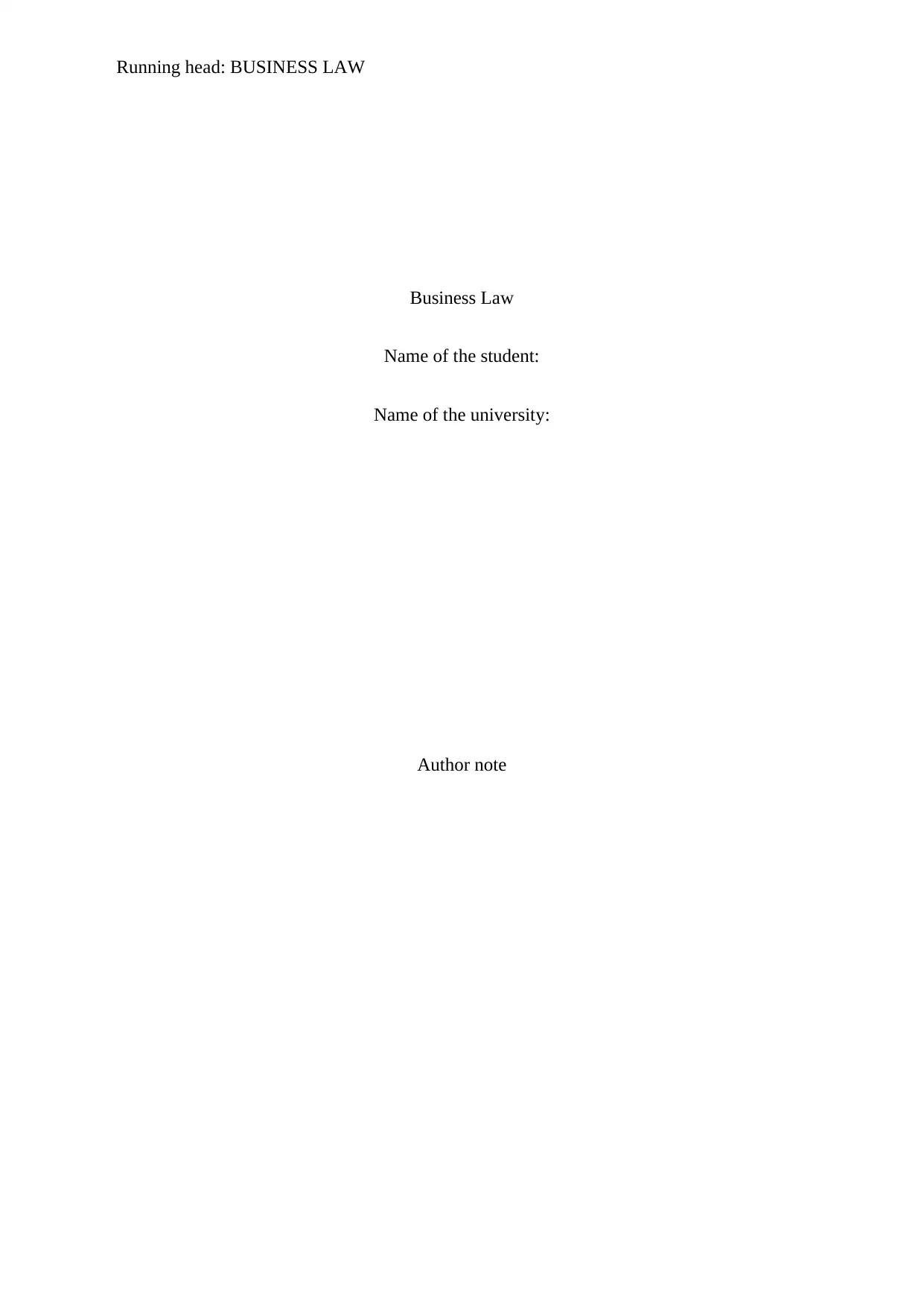
Running head: BUSINESS LAW
Business Law
Name of the student:
Name of the university:
Author note
Business Law
Name of the student:
Name of the university:
Author note
Paraphrase This Document
Need a fresh take? Get an instant paraphrase of this document with our AI Paraphraser
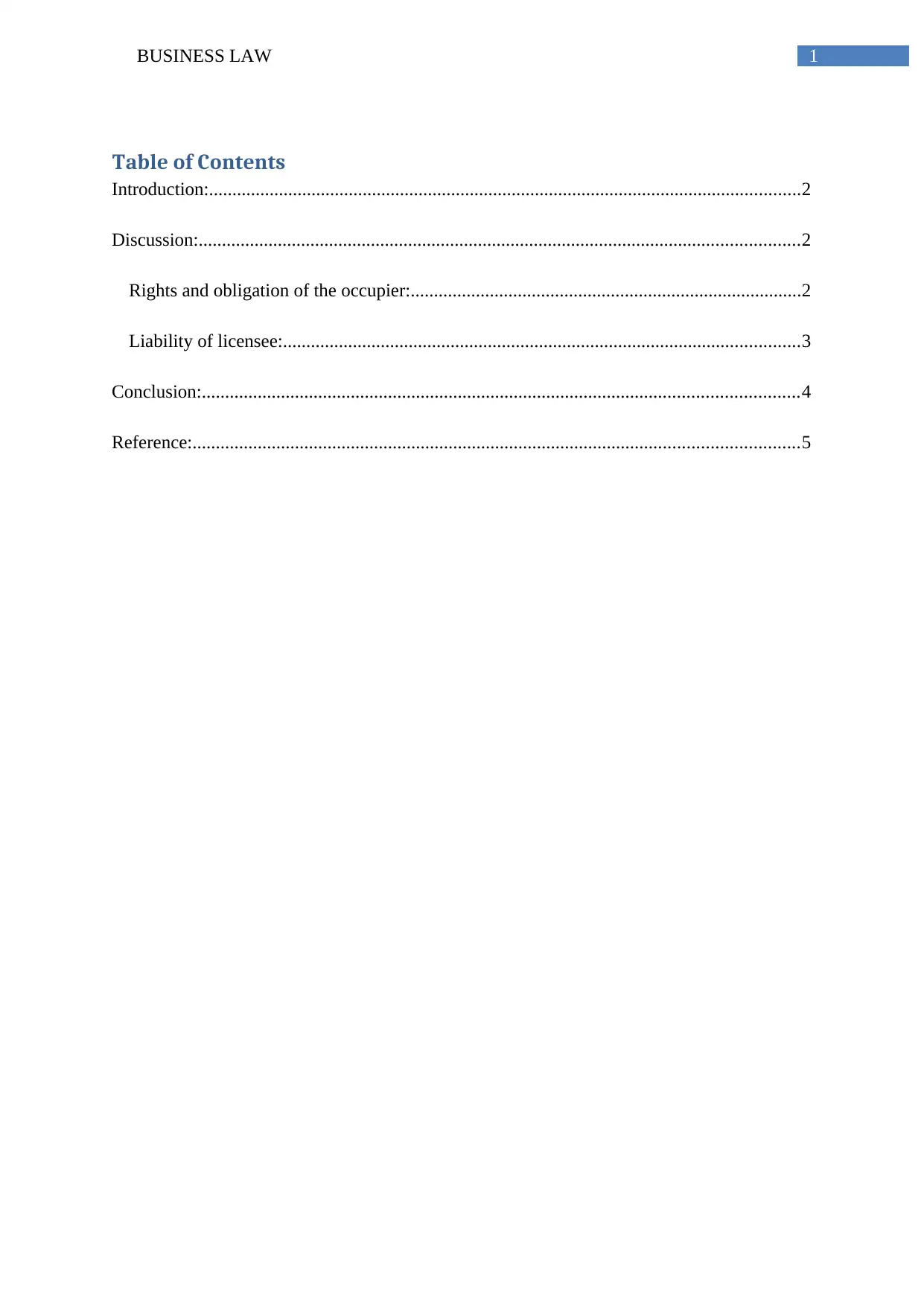
1BUSINESS LAW
Table of Contents
Introduction:...............................................................................................................................2
Discussion:.................................................................................................................................2
Rights and obligation of the occupier:....................................................................................2
Liability of licensee:...............................................................................................................3
Conclusion:................................................................................................................................4
Reference:..................................................................................................................................5
Table of Contents
Introduction:...............................................................................................................................2
Discussion:.................................................................................................................................2
Rights and obligation of the occupier:....................................................................................2
Liability of licensee:...............................................................................................................3
Conclusion:................................................................................................................................4
Reference:..................................................................................................................................5
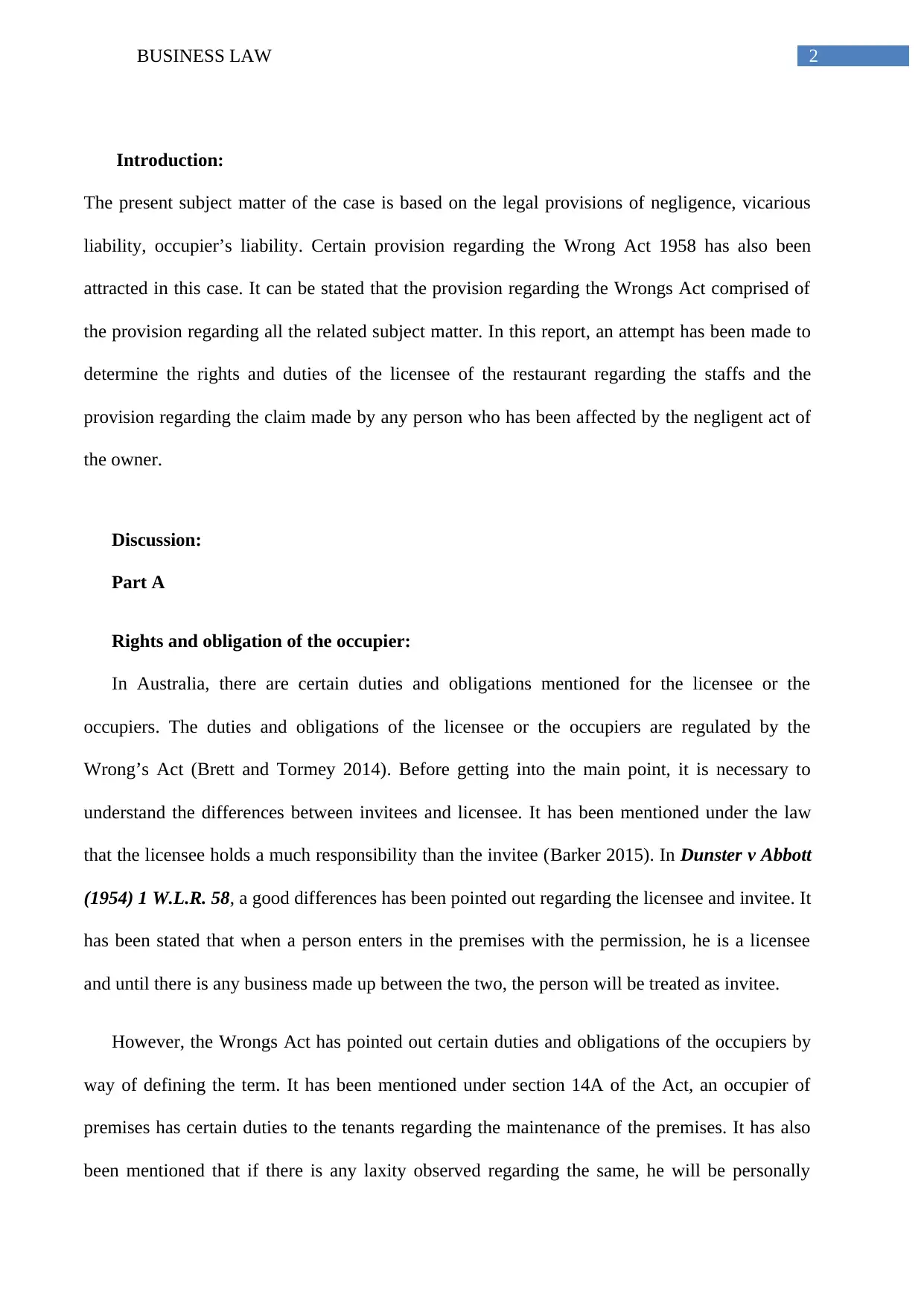
2BUSINESS LAW
Introduction:
The present subject matter of the case is based on the legal provisions of negligence, vicarious
liability, occupier’s liability. Certain provision regarding the Wrong Act 1958 has also been
attracted in this case. It can be stated that the provision regarding the Wrongs Act comprised of
the provision regarding all the related subject matter. In this report, an attempt has been made to
determine the rights and duties of the licensee of the restaurant regarding the staffs and the
provision regarding the claim made by any person who has been affected by the negligent act of
the owner.
Discussion:
Part A
Rights and obligation of the occupier:
In Australia, there are certain duties and obligations mentioned for the licensee or the
occupiers. The duties and obligations of the licensee or the occupiers are regulated by the
Wrong’s Act (Brett and Tormey 2014). Before getting into the main point, it is necessary to
understand the differences between invitees and licensee. It has been mentioned under the law
that the licensee holds a much responsibility than the invitee (Barker 2015). In Dunster v Abbott
(1954) 1 W.L.R. 58, a good differences has been pointed out regarding the licensee and invitee. It
has been stated that when a person enters in the premises with the permission, he is a licensee
and until there is any business made up between the two, the person will be treated as invitee.
However, the Wrongs Act has pointed out certain duties and obligations of the occupiers by
way of defining the term. It has been mentioned under section 14A of the Act, an occupier of
premises has certain duties to the tenants regarding the maintenance of the premises. It has also
been mentioned that if there is any laxity observed regarding the same, he will be personally
Introduction:
The present subject matter of the case is based on the legal provisions of negligence, vicarious
liability, occupier’s liability. Certain provision regarding the Wrong Act 1958 has also been
attracted in this case. It can be stated that the provision regarding the Wrongs Act comprised of
the provision regarding all the related subject matter. In this report, an attempt has been made to
determine the rights and duties of the licensee of the restaurant regarding the staffs and the
provision regarding the claim made by any person who has been affected by the negligent act of
the owner.
Discussion:
Part A
Rights and obligation of the occupier:
In Australia, there are certain duties and obligations mentioned for the licensee or the
occupiers. The duties and obligations of the licensee or the occupiers are regulated by the
Wrong’s Act (Brett and Tormey 2014). Before getting into the main point, it is necessary to
understand the differences between invitees and licensee. It has been mentioned under the law
that the licensee holds a much responsibility than the invitee (Barker 2015). In Dunster v Abbott
(1954) 1 W.L.R. 58, a good differences has been pointed out regarding the licensee and invitee. It
has been stated that when a person enters in the premises with the permission, he is a licensee
and until there is any business made up between the two, the person will be treated as invitee.
However, the Wrongs Act has pointed out certain duties and obligations of the occupiers by
way of defining the term. It has been mentioned under section 14A of the Act, an occupier of
premises has certain duties to the tenants regarding the maintenance of the premises. It has also
been mentioned that if there is any laxity observed regarding the same, he will be personally
⊘ This is a preview!⊘
Do you want full access?
Subscribe today to unlock all pages.

Trusted by 1+ million students worldwide
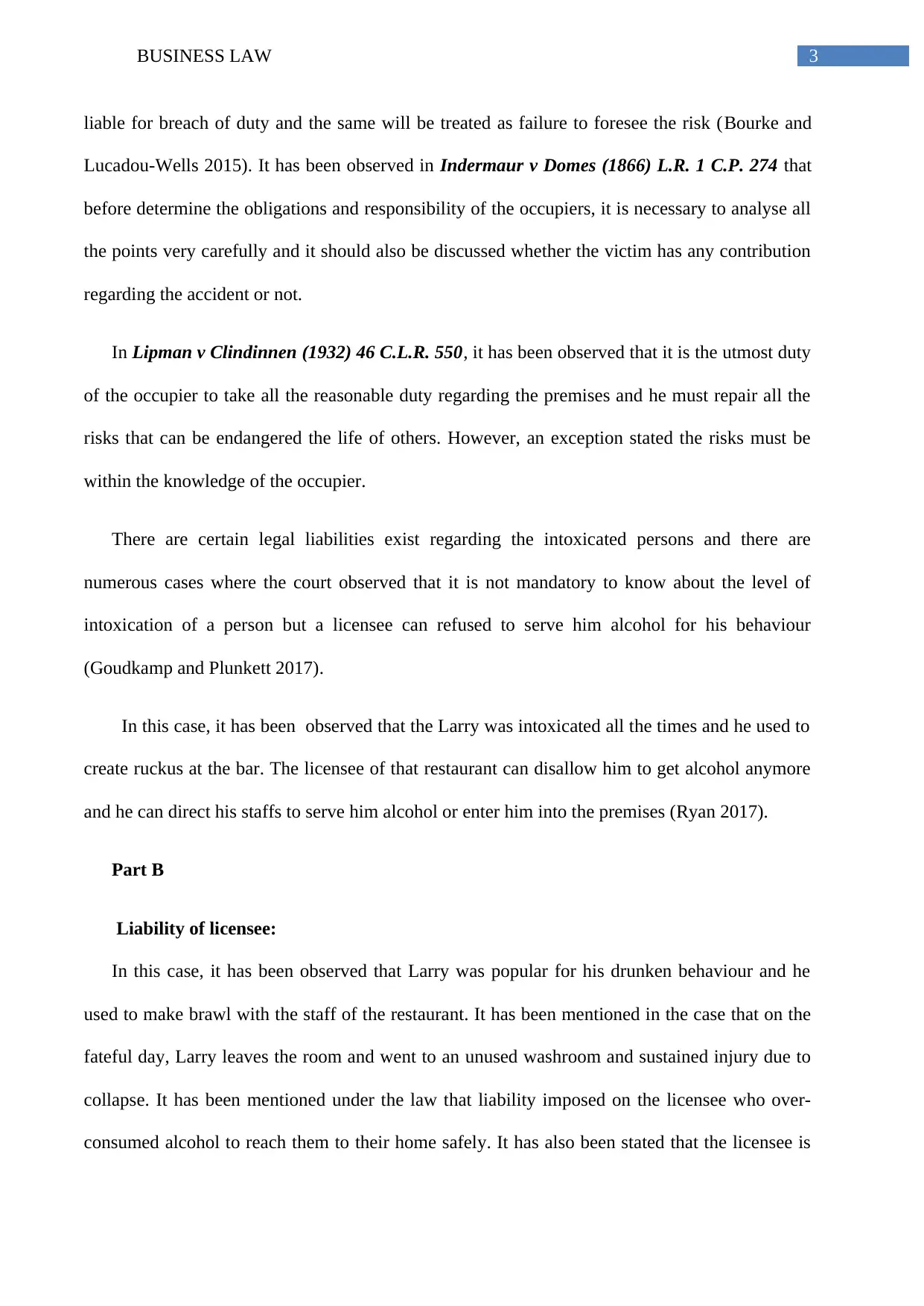
3BUSINESS LAW
liable for breach of duty and the same will be treated as failure to foresee the risk (Bourke and
Lucadou-Wells 2015). It has been observed in Indermaur v Domes (1866) L.R. 1 C.P. 274 that
before determine the obligations and responsibility of the occupiers, it is necessary to analyse all
the points very carefully and it should also be discussed whether the victim has any contribution
regarding the accident or not.
In Lipman v Clindinnen (1932) 46 C.L.R. 550, it has been observed that it is the utmost duty
of the occupier to take all the reasonable duty regarding the premises and he must repair all the
risks that can be endangered the life of others. However, an exception stated the risks must be
within the knowledge of the occupier.
There are certain legal liabilities exist regarding the intoxicated persons and there are
numerous cases where the court observed that it is not mandatory to know about the level of
intoxication of a person but a licensee can refused to serve him alcohol for his behaviour
(Goudkamp and Plunkett 2017).
In this case, it has been observed that the Larry was intoxicated all the times and he used to
create ruckus at the bar. The licensee of that restaurant can disallow him to get alcohol anymore
and he can direct his staffs to serve him alcohol or enter him into the premises (Ryan 2017).
Part B
Liability of licensee:
In this case, it has been observed that Larry was popular for his drunken behaviour and he
used to make brawl with the staff of the restaurant. It has been mentioned in the case that on the
fateful day, Larry leaves the room and went to an unused washroom and sustained injury due to
collapse. It has been mentioned under the law that liability imposed on the licensee who over-
consumed alcohol to reach them to their home safely. It has also been stated that the licensee is
liable for breach of duty and the same will be treated as failure to foresee the risk (Bourke and
Lucadou-Wells 2015). It has been observed in Indermaur v Domes (1866) L.R. 1 C.P. 274 that
before determine the obligations and responsibility of the occupiers, it is necessary to analyse all
the points very carefully and it should also be discussed whether the victim has any contribution
regarding the accident or not.
In Lipman v Clindinnen (1932) 46 C.L.R. 550, it has been observed that it is the utmost duty
of the occupier to take all the reasonable duty regarding the premises and he must repair all the
risks that can be endangered the life of others. However, an exception stated the risks must be
within the knowledge of the occupier.
There are certain legal liabilities exist regarding the intoxicated persons and there are
numerous cases where the court observed that it is not mandatory to know about the level of
intoxication of a person but a licensee can refused to serve him alcohol for his behaviour
(Goudkamp and Plunkett 2017).
In this case, it has been observed that the Larry was intoxicated all the times and he used to
create ruckus at the bar. The licensee of that restaurant can disallow him to get alcohol anymore
and he can direct his staffs to serve him alcohol or enter him into the premises (Ryan 2017).
Part B
Liability of licensee:
In this case, it has been observed that Larry was popular for his drunken behaviour and he
used to make brawl with the staff of the restaurant. It has been mentioned in the case that on the
fateful day, Larry leaves the room and went to an unused washroom and sustained injury due to
collapse. It has been mentioned under the law that liability imposed on the licensee who over-
consumed alcohol to reach them to their home safely. It has also been stated that the licensee is
Paraphrase This Document
Need a fresh take? Get an instant paraphrase of this document with our AI Paraphraser
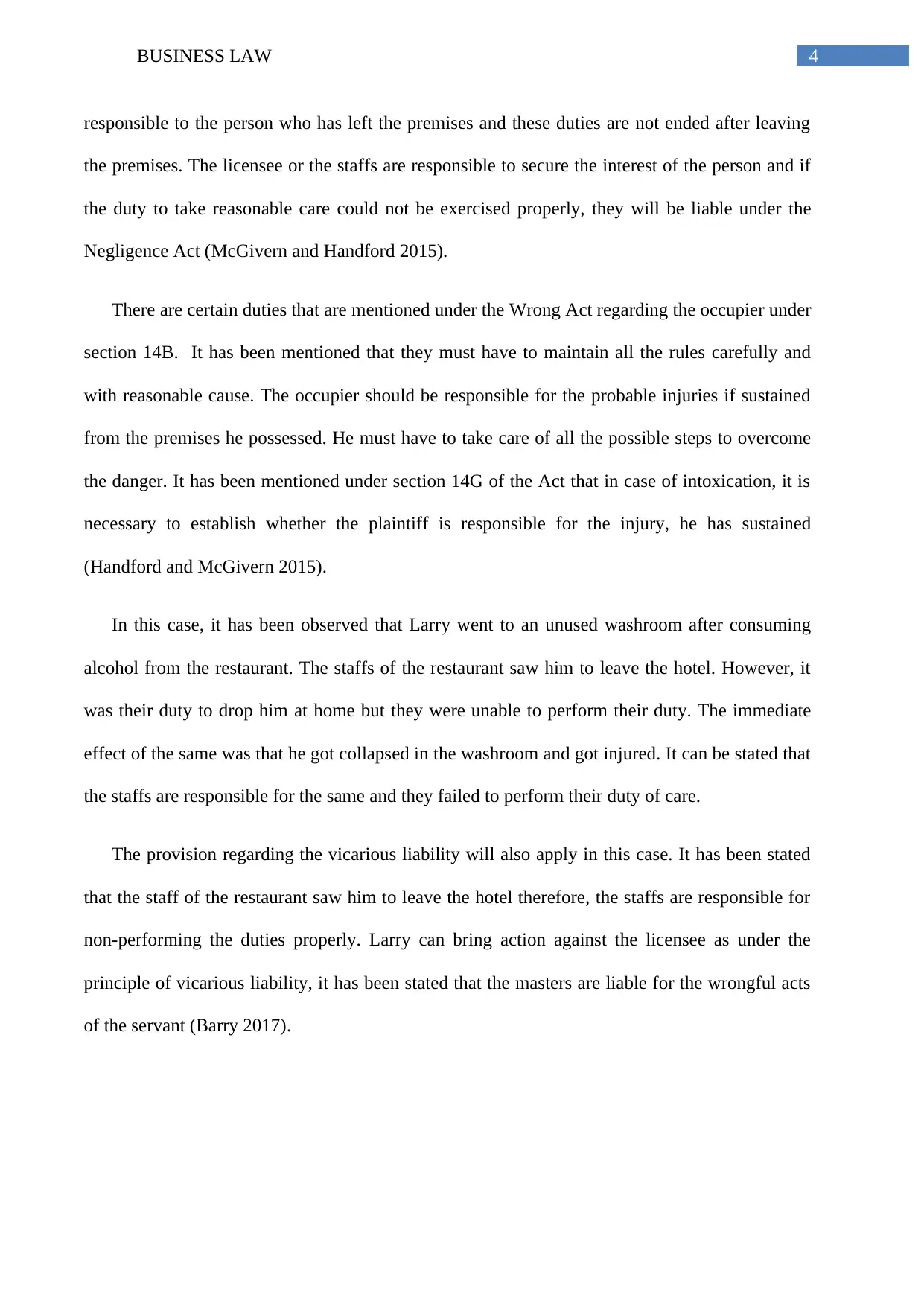
4BUSINESS LAW
responsible to the person who has left the premises and these duties are not ended after leaving
the premises. The licensee or the staffs are responsible to secure the interest of the person and if
the duty to take reasonable care could not be exercised properly, they will be liable under the
Negligence Act (McGivern and Handford 2015).
There are certain duties that are mentioned under the Wrong Act regarding the occupier under
section 14B. It has been mentioned that they must have to maintain all the rules carefully and
with reasonable cause. The occupier should be responsible for the probable injuries if sustained
from the premises he possessed. He must have to take care of all the possible steps to overcome
the danger. It has been mentioned under section 14G of the Act that in case of intoxication, it is
necessary to establish whether the plaintiff is responsible for the injury, he has sustained
(Handford and McGivern 2015).
In this case, it has been observed that Larry went to an unused washroom after consuming
alcohol from the restaurant. The staffs of the restaurant saw him to leave the hotel. However, it
was their duty to drop him at home but they were unable to perform their duty. The immediate
effect of the same was that he got collapsed in the washroom and got injured. It can be stated that
the staffs are responsible for the same and they failed to perform their duty of care.
The provision regarding the vicarious liability will also apply in this case. It has been stated
that the staff of the restaurant saw him to leave the hotel therefore, the staffs are responsible for
non-performing the duties properly. Larry can bring action against the licensee as under the
principle of vicarious liability, it has been stated that the masters are liable for the wrongful acts
of the servant (Barry 2017).
responsible to the person who has left the premises and these duties are not ended after leaving
the premises. The licensee or the staffs are responsible to secure the interest of the person and if
the duty to take reasonable care could not be exercised properly, they will be liable under the
Negligence Act (McGivern and Handford 2015).
There are certain duties that are mentioned under the Wrong Act regarding the occupier under
section 14B. It has been mentioned that they must have to maintain all the rules carefully and
with reasonable cause. The occupier should be responsible for the probable injuries if sustained
from the premises he possessed. He must have to take care of all the possible steps to overcome
the danger. It has been mentioned under section 14G of the Act that in case of intoxication, it is
necessary to establish whether the plaintiff is responsible for the injury, he has sustained
(Handford and McGivern 2015).
In this case, it has been observed that Larry went to an unused washroom after consuming
alcohol from the restaurant. The staffs of the restaurant saw him to leave the hotel. However, it
was their duty to drop him at home but they were unable to perform their duty. The immediate
effect of the same was that he got collapsed in the washroom and got injured. It can be stated that
the staffs are responsible for the same and they failed to perform their duty of care.
The provision regarding the vicarious liability will also apply in this case. It has been stated
that the staff of the restaurant saw him to leave the hotel therefore, the staffs are responsible for
non-performing the duties properly. Larry can bring action against the licensee as under the
principle of vicarious liability, it has been stated that the masters are liable for the wrongful acts
of the servant (Barry 2017).
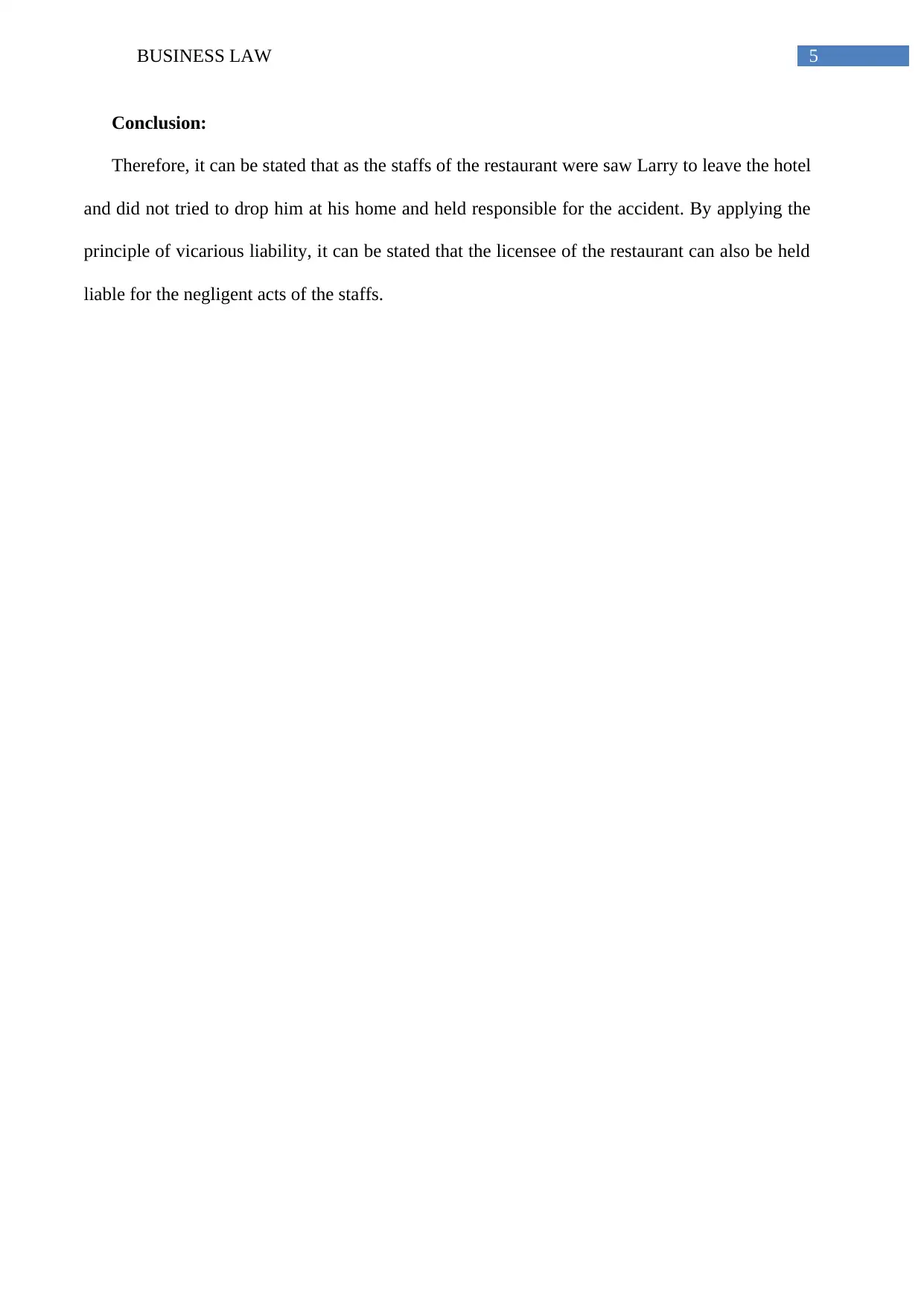
5BUSINESS LAW
Conclusion:
Therefore, it can be stated that as the staffs of the restaurant were saw Larry to leave the hotel
and did not tried to drop him at his home and held responsible for the accident. By applying the
principle of vicarious liability, it can be stated that the licensee of the restaurant can also be held
liable for the negligent acts of the staffs.
Conclusion:
Therefore, it can be stated that as the staffs of the restaurant were saw Larry to leave the hotel
and did not tried to drop him at his home and held responsible for the accident. By applying the
principle of vicarious liability, it can be stated that the licensee of the restaurant can also be held
liable for the negligent acts of the staffs.
⊘ This is a preview!⊘
Do you want full access?
Subscribe today to unlock all pages.

Trusted by 1+ million students worldwide
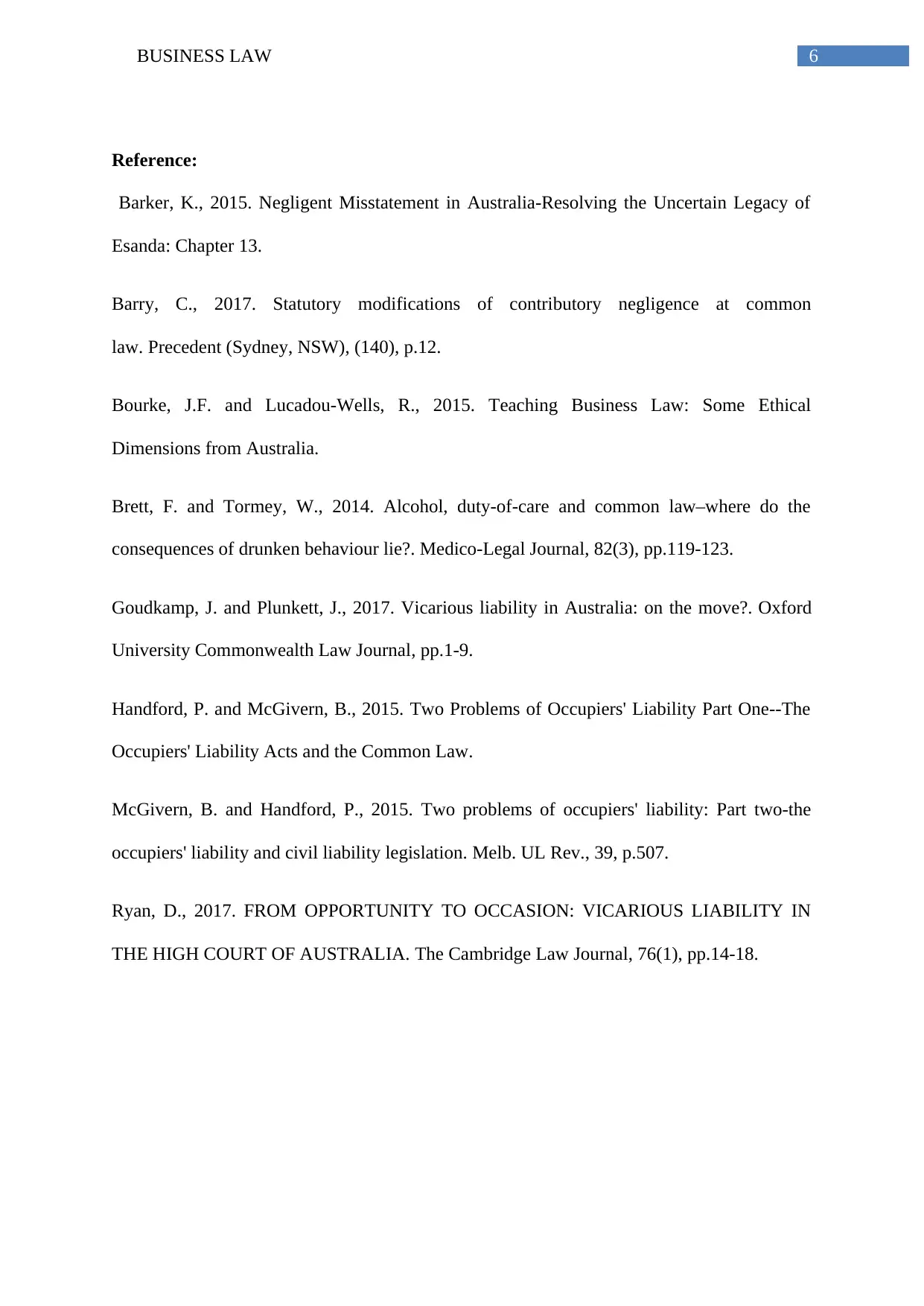
6BUSINESS LAW
Reference:
Barker, K., 2015. Negligent Misstatement in Australia-Resolving the Uncertain Legacy of
Esanda: Chapter 13.
Barry, C., 2017. Statutory modifications of contributory negligence at common
law. Precedent (Sydney, NSW), (140), p.12.
Bourke, J.F. and Lucadou-Wells, R., 2015. Teaching Business Law: Some Ethical
Dimensions from Australia.
Brett, F. and Tormey, W., 2014. Alcohol, duty-of-care and common law–where do the
consequences of drunken behaviour lie?. Medico-Legal Journal, 82(3), pp.119-123.
Goudkamp, J. and Plunkett, J., 2017. Vicarious liability in Australia: on the move?. Oxford
University Commonwealth Law Journal, pp.1-9.
Handford, P. and McGivern, B., 2015. Two Problems of Occupiers' Liability Part One--The
Occupiers' Liability Acts and the Common Law.
McGivern, B. and Handford, P., 2015. Two problems of occupiers' liability: Part two-the
occupiers' liability and civil liability legislation. Melb. UL Rev., 39, p.507.
Ryan, D., 2017. FROM OPPORTUNITY TO OCCASION: VICARIOUS LIABILITY IN
THE HIGH COURT OF AUSTRALIA. The Cambridge Law Journal, 76(1), pp.14-18.
Reference:
Barker, K., 2015. Negligent Misstatement in Australia-Resolving the Uncertain Legacy of
Esanda: Chapter 13.
Barry, C., 2017. Statutory modifications of contributory negligence at common
law. Precedent (Sydney, NSW), (140), p.12.
Bourke, J.F. and Lucadou-Wells, R., 2015. Teaching Business Law: Some Ethical
Dimensions from Australia.
Brett, F. and Tormey, W., 2014. Alcohol, duty-of-care and common law–where do the
consequences of drunken behaviour lie?. Medico-Legal Journal, 82(3), pp.119-123.
Goudkamp, J. and Plunkett, J., 2017. Vicarious liability in Australia: on the move?. Oxford
University Commonwealth Law Journal, pp.1-9.
Handford, P. and McGivern, B., 2015. Two Problems of Occupiers' Liability Part One--The
Occupiers' Liability Acts and the Common Law.
McGivern, B. and Handford, P., 2015. Two problems of occupiers' liability: Part two-the
occupiers' liability and civil liability legislation. Melb. UL Rev., 39, p.507.
Ryan, D., 2017. FROM OPPORTUNITY TO OCCASION: VICARIOUS LIABILITY IN
THE HIGH COURT OF AUSTRALIA. The Cambridge Law Journal, 76(1), pp.14-18.
1 out of 7
Related Documents
Your All-in-One AI-Powered Toolkit for Academic Success.
+13062052269
info@desklib.com
Available 24*7 on WhatsApp / Email
![[object Object]](/_next/static/media/star-bottom.7253800d.svg)
Unlock your academic potential
Copyright © 2020–2026 A2Z Services. All Rights Reserved. Developed and managed by ZUCOL.




